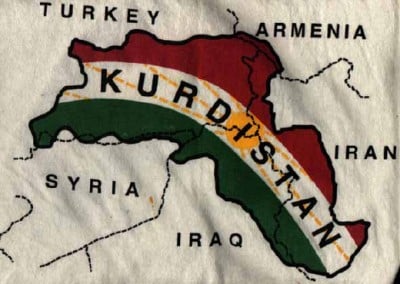A Risky Referendum for Kurdistan Underway in Iraq

At least the combative and haughty Israeli prime minister is forthright: he supports a free and independent Kurdistan. Tomorrow’s vote by Iraqi Kurdish parties to secede from Iraq may well push the country into another war, a civil war. (Doubtless nothing would please Israel more.) The referendum is opposed by neighboring powers, but most significantly by the central government in Baghdad. It is a far more serious move that the well publicized Catalonian vote in Spain scheduled for October 1st, also more perilous than Middle East-watchers let on. Why the Iraqi referendum is receiving so little scrutiny, I don’t know.
Our revered English language “fake-news” establishment (e.g. The NYTimes and The Guardian, among them) is underplaying the significance of a Kurdistan secession, also denying American and British endorsement for it. In reality the US and UK are totally with Israel in promoting and supporting north Iraq’s independence. Iran’s and Turkey’s opposition is well known; Syria would also be in that camp although no one publicly listens to Syria these days. (Remember that US troops are closely collaborating with Syrian Kurdish forces in opposition to Damascus.)
Reading the buried articles on Iraqi Kurdish national aspirations, one would gather it’s a scheme conceived after the 2003 US invasion, and advanced only by Kurdish leaders. This is nonsense.
Although the British divided the large, strategic area occupied mainly by Kurdish-speaking people among Syria, Iraq, Iran and Turkey with their Sykes-Picot “Agreement” during World War I (part of the dissolution of the Turkish Empire), more recent plans by the imperial powers and Israel involve reconfiguring the modern Middle East into smaller and smaller pieces, starting with Iraqi Kurdistan. (Talk of Iraq’s division into three parts arose in 1991; similar scenarios are applied to Syria today.)
Public discussion of an independent Kurdistan has been ongoing since the launch of the US-led war on Iraq. Yes, Washington’s war on Iraq began not with the 2003 invasion but in 1991, with what’s called the Persian Gulf War (as if it was confined to that area). The ongoing assault included the murderous, destabilizing and destructive embargo war that continued from 1990 to 2003).
As for the Kurds, readers will recall images of tens of thousands of besieged families fleeing into the mountains ostensibly pursued by Saddam’s army. Without delay, humanitarian-motivated (sic) western powers rushed to the Kurds’ aid, using the opportunity of diversionary assaults in pursuit of Saddam and the Baathists, to essentially occupy the three Kurdish governates on behalf of that besieged minority. With Kurdish leaders’ wholehearted complicity, occupation was easily secured by a band of CIA agents, a low profile US military contingent working with an Israeli team, protected by the insipid northern “no-fly zone” (blessed, I believe, by the United Nations Security Council). The Kurdish region has remained semi-autonomous since then, sanctioned by a clause in the US-framed Iraqi constitution granting Kurds a degree of autonomy. Day by day, year by year, those three Kurdish governates have enjoyed protection, economic development, including a thriving tourist industry, freedom from any sanctions, and free to sell oil from its territory directly to foreign companies, all unquestioned thanks to its benevolent international image in human rights reports and the press.
During these 26 years, tensions between the central government and the KRG (Kurdish regional government) in Erbil have steadily heightened. Neither US occupiers nor other influential forces in Iraq have done anything to lessen the crisis. American Kurdish experts led by the intrepid former US diplomat Peter Galbraith have consistently argued for an independent Kurdistan.
Then there is Kirkuk: Iraq’s major city in the area lies outside that semi-autonomous Kurdish region. Until 1991 Kirkuk was overwhelmingly inhabited by Iraqi Turkmen people. Kirkuk and smaller nearby cities (e.g. Tel Afar) have been a Turkmen homeland for centuries, an area profoundly and unquestionably Iraqi in loyalty. You’d never know this from western press accounts which characterize Kirkuk simply as a center of oil deposits. I say Kirkuk was a largely Turkmen city because that has changed; since 1991 Iraqi Kurds have been steadfastly engaged driving Turkmen from their towns while repopulating them with Kurdish families. Although no mass killings of Turkmen have occurred as far as I am aware, there has been a major ethnic cleansing underway, turning Kirkuk from a major Turkmen society into a Kurdish one. All this has been in preparation for the inclusion of Kirkuk into the anticipated autonomous Kurdistan, a process known and condoned by US, Israel and the UK policy makers.
With the coming referendum, although the three regions (minus Kirkuk) enjoyed a marked degree of independence, despite successive Baghdad government attempts to limit this, Kirkuk now become the additional prize and a noted target in the coming referendum.
Baghdad opposes the referendum as strongly as Madrid rejects Catalonia’s independence vote. In recent weeks Madrid has taken startlingly firm action to thwart the regional vote. Baghdad’s position is as uncompromising; a federal court has declared the referendum illegal according to the Iraqi constitution, and Baghdad declared its readiness to use military action, at least to hold Kirkuk. Don’t believe news reports that the US and its allies oppose this referendum. Note the absence of any diplomatic effort by Washington to help reach a compromise and avoid another period of strife there.
All Iraqis must be feeling very nervous tonight.

